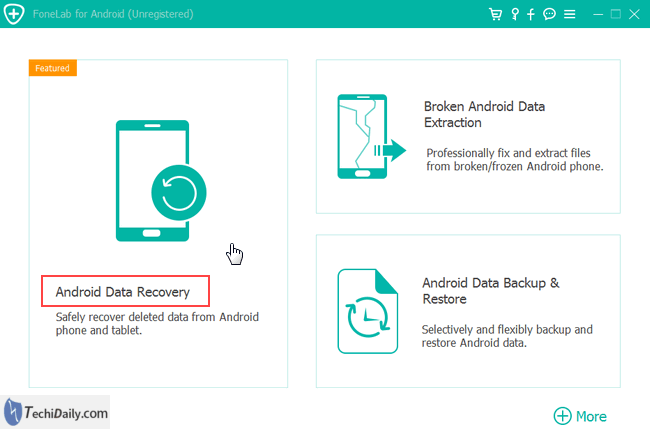Simple ways to get recent calls back from A78


You might delete calls from your Oppo A78’s call-logs history that you didn’t mean to delete or to which you might need to refer later. You might also want to see the deleted call-log history on someone Oppo A78 like your spouse’s Oppo A78 to see what he’s been up to. Once calls are deleted from your Oppo A78, they are still located on the device’s SIM card. Regardless of the reason, you can retrieve a deleted call-log history with the appropriate recovery tool.
The Android Data Recovery, a cutting edge program, is designed to help all Android users to recover deleted/lost data from Android phones which includes Samsung Galaxy, Google Nexus, LG, Sony, HTC, Motorola, Huawei, OnePlus, and ZTE. Only with several clicks, it is available to recover deleted call logs, videos, photos, text messages, WhatsApp, contacts, call logs and document files from Android phone.
- Part 1: Recovering call logs(history) from your Oppo A78 (on macOS)
- Part 2: Recovering call logs(history) from your Oppo A78 (on Windows)
Step 1: Download and launch the Android Data Recovery on Mac
Download and install the Android Data Recovery on your Mac computer, when you open it, a dialog box will pop up to remind you whether to register, purchase or free try.

Step 2: Connection
Run this powerful Android data recovering software on your Mac computer, and then connect your Oppo A78 device to computer via the USB cable. The program will detect your device automatically.
Step 3: Enable USB debugging.
Android Data Recovery will prompt you to enable USB debugging on your Oppo A78, if you don’t open the debugging mode. The program will detect the version of your Oppo A78 automatically and give you the instruction of opening the USB debugging mode on your Oppo A78. After finishing the operations on your device, click “OK” button.
Step 4: Select the call logs you want to recover.
After connection, all file types on your Oppo A78 will be showed in the interface. Choose the file types you want to recover, such as contacts, messages, messages attachments, call logs, photos, gallery, picture library, videos, audios and other documents. Check the file types you want to recover and click Next. The program will scan your device automatically.
Step 5: click “Recover” button to complete recovering Oppo A78’s call logs
When the scanning is finished, all types of files will be listed in categories on the left control. You are allowed to check the detailed information of each data. Preview and select the data you want to recover, and then click “Recover” button to complete recovering process.
Step 1: Download and launch the Android Data Recovery
Download and install the Android Data Recovery on your Windows computer.
Step 2: Connection
Connect your Oppo A78 device to your Windows computer via the USB cable. Wait for seconds before the device is detected. Install the device driver on your computer if it hasn’t been installed.
Step 3: Enable USB debugging.
Allow USB debugging when your Android prompts you of USB debugging permission. After finishing the operations on your Oppo A78 device, click “OK” button.
Step 4: Preview and recover the Oppo A78’s lost call logs.
Soon, all Android available files will be classified into category on the left. You can toggle the button of “Only display the deleted item(s)” to “On”, so that you can quickly find the wanted Android file. Click “Recover” button and choose a destination folder to recover files. Within seconds, you can navigate to the file folder and check your deleted files from Oppo A78.
You can recover calls in bulk or if you want to just select specific files to restore, you can easily do it. Aside from bringing back all information you lost, Android Data Recovery has the capability to make repairs on your Oppo A78's system.
Also read:
- [Updated] DIY YouTube Music Collection A Comprehensive Online & App Method for 2024
- [Updated] Thorough Breakdown Google's Podcast App Unveiled for 2024
- 2024 Approved From Novice to Notorious Top 20 Vlogging Ideas
- Elevate Online Presence: The Cookiebot Advantage for Sustainable Traction
- How to Downgrade Apple iPhone 6s Plus without Losing Anything? | Dr.fone
- How to Hard Reset Lava Yuva 3 Without Password | Dr.fone
- How to Reset a Vivo Y200e 5G Phone That Is Locked | Dr.fone
- How To Transfer Data From Apple iPhone 14 Pro To Others devices? | Dr.fone
- Overcoming Input Lag in Valorant: Tips and Tricks for a Smoother Experience, 2024 Edition
- Recover lost data from Realme C67 4G
- Solutions to restore deleted files from Honor V Purse
- The way to get back lost call history from Honor Magic V2
- Unleashing Potential A Guide for Solitary Showrunners for 2024
- Unraveling 2022'S Pivotal Moments in Google News
- Use Device Manager to reinstall your drivers in Windows 11/10
- Title: Simple ways to get recent calls back from A78
- Author: Ian
- Created at : 2025-01-21 17:08:29
- Updated at : 2025-01-29 22:55:15
- Link: https://techidaily.com/simple-ways-to-get-recent-calls-back-from-a78-by-fonelab-android-recover-call-logs/
- License: This work is licensed under CC BY-NC-SA 4.0.